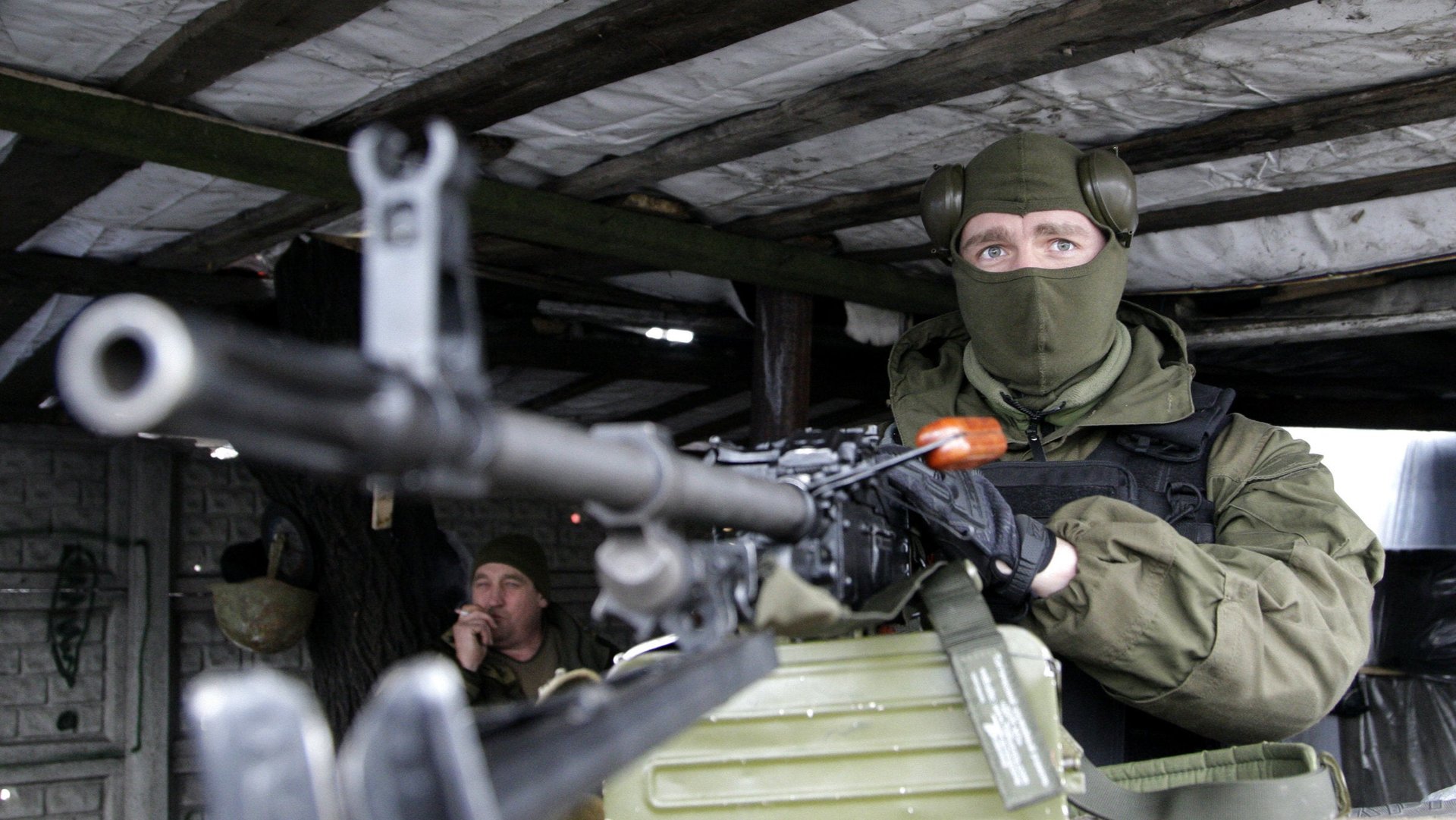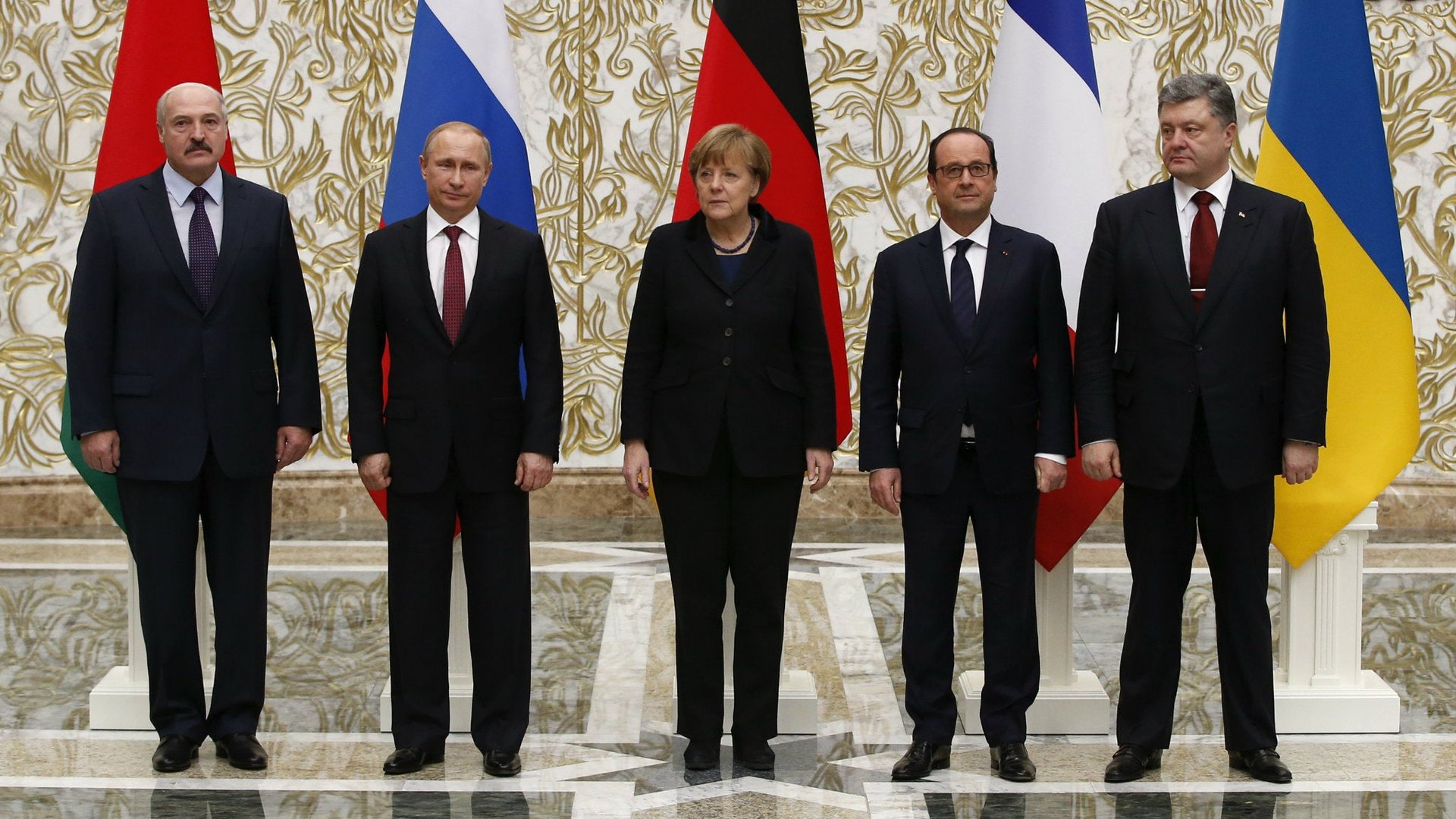Ukraine’s ceasefire gives separatists two days “to conquer as much territory as they can”
More than 12 hours into talks between the leaders of Ukraine, Russia, France, and Germany, Ukrainian president Petro Poroshenko emerged to tell reporters that there was “no good news yet” on a deal to end the fighting in eastern Ukraine.


More than 12 hours into talks between the leaders of Ukraine, Russia, France, and Germany, Ukrainian president Petro Poroshenko emerged to tell reporters that there was “no good news yet” on a deal to end the fighting in eastern Ukraine.
Several hours later, the leaders emerged with not one but two documents. The first, a joint declaration, was long on generalities and platitudes. The second, more substantial agreement features several points of action, notably a ceasefire between Kyiv’s forces and pro-Russian separatists that will begin on Feb. 15.
Increasingly fierce fighting in eastern Ukraine—at Kramatorsk, Mariupol, and Debaltseve—has pushed the death toll above 5,000 over the past nine months. Some one million Ukrainians have also been displaced by the violence.
The stony faces of the leaders as they announced the ceasefire should be a clue that this is far from a definitive end to the fighting. The so-called “Minsk II” agreement is, as the name suggests, a second attempt to establish peace in Ukraine after tense talks in the Belarussian capital. The first ceasefire, agreed upon in September, broke down almost immediately. There is little confidence that the latest deal won’t suffer the same fate.
Ian Bond, a former British diplomat with postings across eastern Europe, fears a breakdown of the ceasefire is “inevitable.” One point in the agreement is particularly troubling—at the time of the ceasefire, Kyiv’s military must withdraw its heavy artillery at least 50 kilometers (31 miles) from the line of contact with separatist forces.

“Putin’s guys now have two and half days to conquer as much territory as they can,” Bond tells Quartz from his office at the Centre for European Reform, a London-based think tank. “They’ve created an incentive to seize as much ground as possible.”
Indeed, dozens of tanks and missile systems reportedly crossed from Russia into Ukraine during the ceasefire talks. Russian president Vladimir Putin made a statement after the negotiations suggesting that Ukraine’s forces in Debaltseve should surrender to the separatists who now surround them. The Kremlin continues to deny any direct involvement in arming or directing the separatists across the border.
For Kyiv, the proposed withdrawal of heavy weapons from the current line of control, to say nothing of potential separatist advances in the coming days, could make defending key cities like Mariupol much more difficult. As it happens, another large aid convoy from Russia is scheduled to pass into Ukraine on the first day of the ceasefire.
Speaking of borders, Ukraine is unlikely to regain control of its eastern boundary for some time. Before Kyiv is allowed to man the border in the conflict zone, the agreement calls for local elections in the Donetsk and Luhansk regions, and changes to Ukraine’s constitution to recognize a unique form of decentralization for the areas by the end of 2015.
“That means that it’s up to Putin to decide at the end of the year whether Ukraine has surrendered enough of its sovereignty for him to be willing to give back control of the border,” Bond says. “Do you think that’s going to happen?”
Despite these shortcomings, Poroshenko had little leverage to achieve a better deal. The IMF announced a new bailout of the country’s shattered economy today, but Ukraine is outmatched militarily. Analysts are divided on whether Washington is willing to provide arms to Ukraine without the EU doing the same. Don’t hold your breath, says Bond:
The EU has no stomach for getting into any sort of fight with Russia. Who does? But the fact is there is a war going on in Europe, and it is getting closer to us. At some point, even the ostriches in Berlin and Paris will have to pull their heads out of the sand and take notice.